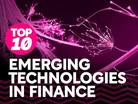Top 10: Emerging Technologies in Finance

Digital innovation is radically democratising financial services, breaking down traditional barriers and creating new possibilities for businesses and consumers alike.
In our latest top 10, we look at how emerging technologies are converging to create smarter, more sustainable and more inclusive financial systems.
From quantum-resistant security protocols to green fintech infrastructure, these innovations are rewriting the rules of global finance.
As artificial intelligence meets decentralised systems and embedded finance transforms everyday transactions, we're witnessing a fundamental shift in how financial services are delivered, accessed and experienced.
10. IoT Payment Networks
The Internet of Things (IoT) has revolutionised financial services by creating an interconnected ecosystem of clever devices that gather and transmit real-time data. Industry leaders like Vodafone Business and HSBC are leveraging IoT for contactless payments and automated insurance claims through connected cars and smart home systems. With blockchain and AI integration promising more transformative applications and an estimated 27 billion connected devices by 2025, IoT's role in fintech is poised for explosive growth.
9. Voice-First Banking
Voice-first banking has transformed financial services by enabling hands-free, conversational interactions with banking systems through smart speakers and virtual assistants. Pioneered by Capital One's integration with Amazon's Alexa in 2016, this technology has evolved to support complex transactions, from account inquiries to bill payments. With NatWest and Barclays leading UK innovation in voice authentication and banking commands, and advances in natural language processing improving security and functionality, voice-first banking is set to reshape how customers interact with financial services.
8. Autonomous Finance Platforms
Autonomous Finance Platforms are changing wealth management by leveraging AI and machine learning to automate financial decision-making and portfolio management. Led by innovators like Wealthfront and Moneybox, these platforms have evolved from simple robo-advisers to sophisticated systems that automatically optimise savings, investments and bill payments. With integration of advanced predictive analytics and personalised risk management algorithms, and projections showing the autonomous finance market reaching US$45bn by 2024, these platforms are poised to democratise professional-grade financial management for everyday investors.
7. RegTech 3.0
RegTech 3.0 represents the next evolution in regulatory technology, leveraging advanced AI and machine learning to transform compliance management. Led by pioneers like ComplyAdvantage and Clausematch, these solutions have evolved beyond basic automation to provide real-time compliance monitoring and predictive risk analytics. With new capabilities in automated regulatory reporting, dynamic policy management and AI-driven fraud detection, and the global RegTech market projected to reach US$21.7bn by 2026, RegTech 3.0 is set to revolutionise how financial institutions handle regulatory obligations.
6. Central Bank Digital Currencies (CBDCs)
As central banks worldwide race to digitise their currencies, CBDCs have emerged as a critical frontier in financial innovation. The Bank of England's exploration of 'Britcoin' and China's advanced digital yuan pilot programme showcase how these sovereign digital currencies are moving from concept to reality. With capabilities spanning programmable money, offline transactions, and streamlined cross-border payments, CBDCs are gaining momentum - over 100 countries, representing 95% of global GDP, are now actively exploring their implementation, signalling a fundamental shift in monetary systems.
5. Green Fintech Infrastructure
The urgent drive towards sustainability has catalysed a new wave of green fintech infrastructure development. Pioneering platforms like Util and Clima are transforming how financial institutions measure, track and validate environmental impact across their portfolios. Through advanced ESG data analytics, carbon footprint monitoring and sustainable investment screening tools, these solutions are reshaping financial services. With global ESG assets projected to reach US$53tn by 2025 and mounting regulatory pressure for climate risk disclosure, green fintech infrastructure stands at the forefront of sustainable finance innovation.
4. AI-Powered Personalised Banking
Artificial Intelligence is fundamentally reshaping personal banking, moving beyond basic chatbots to deliver hyper-personalised financial experiences. Industry pioneers like Singapore's DBS and Brazil's Nubank are deploying sophisticated AI systems that analyse spending patterns, predict cash flow issues, and provide tailored financial guidance. By combining machine learning with behavioural analytics, these platforms offer everything from automated savings recommendations to proactive fraud detection. With AI in financial services expected to surpass US$95bn in value by 2025, personalised AI banking assistants are becoming the new standard in retail banking.
3. Decentralised Identity Solutions
Securing digital identities lies at the heart of future financial services, and decentralised identity solutions are leading this transformation. Projects like Privado ID (formerly Polygon ID) and Civic are pioneering self-sovereign identity systems that let users control their personal data whilst meeting stringent KYC requirements. By leveraging blockchain technology and zero-knowledge proofs, these platforms enable passwordless authentication, portable credit histories, and privacy-preserving verification. With the digital identity market set to reach US$70bn by 2026 and growing regulatory support for decentralised credentials, these solutions are reshaping how we think about identity in finance.
2. Quantum-Resistant Cryptography
The looming quantum computing era has sparked a crucial shift towards quantum-resistant cryptography in financial services. Leading institutions like JPMorgan and Goldman Sachs are spearheading the adoption of post-quantum encryption algorithms to protect sensitive financial data against future quantum threats. By implementing lattice-based cryptography and hash-based signatures, these solutions safeguard everything from digital transactions to long-term data storage. With quantum computers expected to break current encryption standards within a decade and NIST finalising quantum-resistant standards, financial institutions are racing to fortify their cryptographic infrastructure.
1. Embedded Finance
Non-financial brands are rapidly weaving banking services into their digital ecosystems, marking a new chapter in financial democratisation. Tech giants like Uber and Shopify have transformed from mere platforms into comprehensive financial service providers, embedding payment processing, lending and insurance directly into their customer journeys. Through APIs and Banking-as-a-Service platforms, these companies now offer seamless financial experiences without traditional banking friction. With the embedded finance market projected to reach US$230bn by 2025 and rising demand for contextual financial services, this integration of finance into everyday digital experiences continues to accelerate.
Explore the latest edition of FinTech Magazine and be part of the conversation at our global conference series, FinTech LIVE.
Discover all our upcoming events and secure your tickets today.
FinTech Magazine is a BizClik brand




